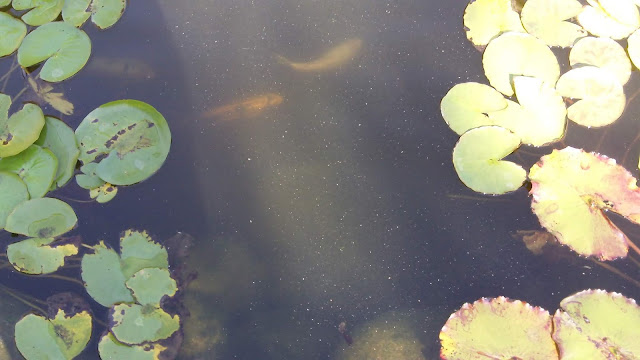Mosquitoes
What to Do and Not Do for Mosquito Prevention
Forgive me for my naivety, but I have always been so confused when customers ask us if we sell Mosquito Fish. Unfortunately I assumed everyone understood mosquito control in their ponds. Shame on me... So let's talk about it now.
 |
| Dragonflies help with mosquitoes even while they're adults. |
Forgive me for my naivety, but I have always been so confused when customers ask us if we sell Mosquito Fish. Unfortunately I assumed everyone understood mosquito control in their ponds. Shame on me... So let's talk about it now.
First of all, understand that the media makes us crazy. Mosquitoes aren't a new thing and have always spread disease. We don't need updates on the latest cases of West Nile, we just need to be smart. Local agencies do, and should, look out for standing water and treat those areas appropriately. But there should be no areas in your yard that require any type of spray or mosquito fish. Here's why:
Mosquitoes lay their eggs in stagnant water. I don't know many water features that are stagnant. Isn't that kinda the point of a water feature ... moving water? If you have a patio pond or planter with aquatic plants and there's no movement... use our mosquito dunks. They're safe for plants, pets, birds, etc. Also make sure that bird baths are changed at least every week. I'm sure your birds help you with that anyway. Mosquitoes grow from egg to adult in 10 days to three weeks, so it's a matter of emptying that bird bath at least every 10 days.
So what if there's a still area of your pond? Maybe there's a place behind a rock or under some plants where the water isn't circulating. Should you add some mosquito fish (gambusia) to your pond? I can't be more emphatic on this one... absolutely not. Koi, goldfish, even game fish (native fish) eat mosquito larva. There's no need to introduce any other species unless you just particularly like looking at these little 2" fish. Here's why:
Mosquito fish will eat anything that fits into their mouths including worms, small crustaceans, insects, snails, tadpoles, eggs, fry (baby fish). The problem with this is that they can starve out other fish, frogs, toads, etc. It's been reported that Gambusia may prefer to consume macro-invertebrates other than mosquito larvae which may include species of macro-invertebrates that also pray on mosquito larvae. (This includes dragonfly larva!) Does this make any sense?
Remember it's better for your koi and goldfish to eat naturally. Yes, we often times supplement their feeding with commercial fish food, but that's for us, not the fish. We like to feed them to make them friendly and aid in their growth rate. But natural food in the pond like mosquito larva, insects, and algae is best for them.
Mosquito fish are also known for their aggressive behavior. They will nip on the fins and tails of larger fish. Plus, one female mosquito fish can produce up to 200 young each year. And all those female young can begin breeding themselves in 21 to 28 days. They can overpopulate a pond in a hurry. Granted, mosquito fish aren't usually hardy in our area. But I'm sure no one wants a few hundred (or thousand) dead fish in their pond over the winter. Those decaying fish can cause serious problems for a pond's ecosystem and more specifically the other, hardy fish.
So here's the bottom line... Mosquitoes lay eggs in still water. If there's a still area in your pond your goldfish, koi, tadpoles, dragonfly larvae, etc. will eat all the mosquito larva in you pond. Change out the water in your birdbath at least every 10 days and watch for other areas that can trap water such as unused pots (store them upside down) and clogged gutters. For aquatic pots with no moving water use mosquito dunks.
Let's keep ourselves and our ponds safe this summer!
Written by Staci
Cool Ponds Co-owner



Comments